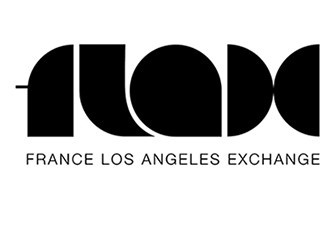Maybe Some Of Us Will Change This March 17, 2019 ➽ June 30, 2019
Brognon-Rollin:
Maybe Some Of Us Will Change This
Maybe some of us will change this—a phrase from a student essay about justice—lodged itself into the psyche of artists David Brognon and Stéphanie Rollin, aka Brognon-Rollin, during their month-long residency with France Los Angeles Exchange (FLAX) and ICA LA at Metropolitan Continuation High School in Downtown Los Angeles. Metropolitan provides an alternative study program to help youth complete their high school diploma. Maybe some of us will change this, expresses hope and ambition with a dash of realistic uncertainty.
The time at Metropolitan High School allowed Brognon-Rollin to make work based on their practice of embedding themselves in a community. Their process involved a journey to the Mexican border and a collaboration with a sound engineer, educators, and the students themselves. The phrase, maybe some of us will change this, reflects a desire to address current tensions around migration, the “Border Wall,” and intolerance.
The Oaxacan whistling language of Mazatec is an indigenous form of communication from the agricultural region of Oaxaca. Whistled language is designed to travel beyond the average distance of the spoken word. It moves melodically across valleys and through thick mountain fog from farmer to farmer. This method of communication struck Brognon-Rollin as the perfect way to transmit the student’s hopeful message through sound—unstoppable by a border or a wall.
Maybe some of us will change this was translated into Spanish, then into spoken Mazatec, and finally into whistled Mazatec by linguist and educator Eloy Garcia who is dedicated to protecting this indigenous language. Garcia traveled from his village of Huautla de Jimenez to Tijuana to whistle the phrase at the seaside border fence that separates Mexico and the United States. The sound of the phrase was received and recorded by Brognon-Rollin on the US side of the fence and brought back to Los Angeles.
Metropolitan High School students learned to whistle the phrase and were recorded by the artists. The recordings of the students’ whistled phrases will be presented in three ways: through the Metropolitan High School’s PA system; through an immersive sound installation at ICA LA; and through soundtracks on ice cream trucks as they drive around local neighborhoods.
Mazatec is one of the oldest remaining whistled languages in the world. It is in jeopardy of being lost to modern communication technology. Maybe some of us will change this.
ICA LA’s learning and engagement programs are made possible by the 5,000 Kids Fund and Fieldwork.
Generous support for Brognon-Rollin: Maybe Some of Us Will Change This is also provided by the Flax Foundation, Maria Greenshields-Ziman and Ralph Ziman, and the Fonds National Culturel, Luxumbourg.
Special thanks to Eloy Garcia, Alfonso Garza, Astrid and Eddie Sykes, Antoine Bertin (Studio SoundAnything), Darline Morales, Richard Jenssen, Gregory Soden, and Roger Salisch.
Brognon-Rollin
Brognon-Rollin work with raw, often marginal social material where the recurrent themes are confinement, expectation, and control. They confront these restrictive systems with their own systems of refracting reality. Curious and intrepid, the two artists go wherever their research takes them, working in the field and in direct, occasionally physical, confrontation with their subjects.
Their work is in such public collections as The Israel Museum (Jerusalem, Israel); MAC’S (Le Grand-Hornu, Belgium); Collection MUDAM (Luxembourg); FRAC Alsace, Poitou-Charentes, Lorraine, France; Centre National d’Arts Plastiques (Paris, France). They are winners of the Pirelli Art Prize at Art Brussels (2013) and finalists for the Prix Fondation Entreprise Ricard (2015) in Paris. David Brognon, born in Messancy, Belgium, and Stéphanie Rollin, born in Luxembourg City, Luxembourg, live and work in Paris, France.
FLAX Foundation
FLAX (France Los Angeles Exchange) is non-profit organization committed to collaboration, innovation, exchange, and sustainable impact. FLAX’s program offers Southern California artists and organizational partners reciprocal and collaborative opportunities with artists, curators, and cultural institutions based in France.
Metropolitan High School
Metropolitan High School welcomes students who have fallen behind in their academic credits but are still committed to earning a high school diploma. Through a highly academic program, the school is dedicated to helping students realize their potential by developing habits that lead to success. Students come to Metropolitan at risk of becoming a drop-out and leave as graduates to pursue a college degree or further job training. The school’s mission is to establish an enriching and nurturing environment where students grow academically, as well as personally and socially, in order to make positive life choices.
Brognon-Rollin: Maybe Some of Us Will Change This: Multichannel Audio
Sunday, March 17, 2019
Whistles, Borders, and Ice Cream Trucks: an artist talk with Brognon-Rollin
David Brognon and Stéphanie Rollin in conversation with Anna Milone, moderated by Asuka Hisa, ICA LA
Wednesday, March 20, 2019







